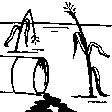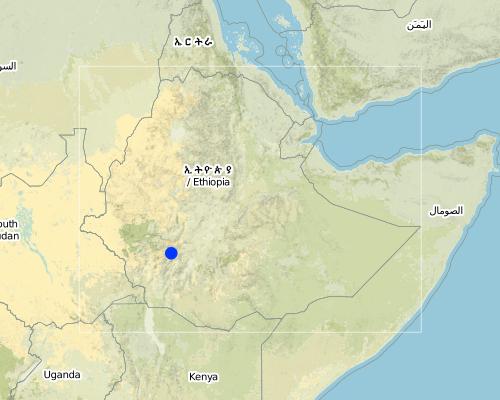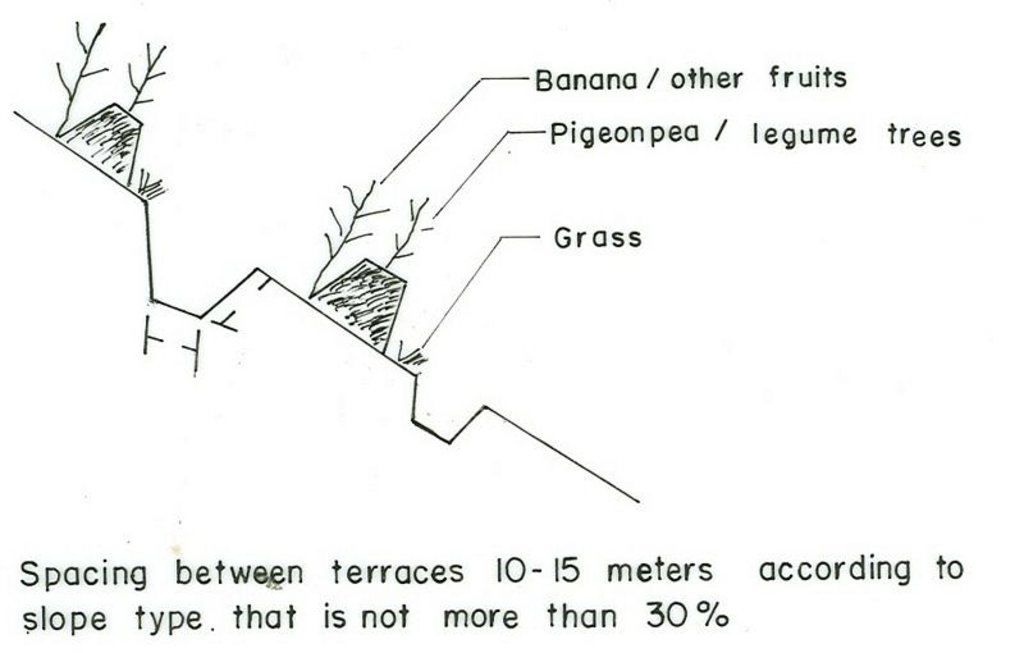Vegetated Fanya juu [ប្រទេសអេត្យូពី]
- ការបង្កើត៖
- បច្ចុប្បន្នភាព
- អ្នកចងក្រង៖ Unknown User
- អ្នកកែសម្រួល៖ –
- អ្នកត្រួតពិនិត្យ Fabian Ottiger
Ye Masa Erken (Amharic)
technologies_1074 - ប្រទេសអេត្យូពី
ពិនិត្យមើលគ្រប់ផ្នែក
ពង្រីកមើលទាំងអស់ បង្រួមទាំងអស់1. ព័ត៌មានទូទៅ
1.2 ព័ត៌មានលម្អិតពីបុគ្គលសំខាន់ៗ និងស្ថាប័នដែលចូលរួមក្នុងការវាយតម្លៃ និងចងក្រងឯកសារនៃបច្ចេកទេស
បុគ្គលសំខាន់ម្នាក់ (ច្រើននាក់)
អ្នកជំនាញឯកទេស SLM:
Fikadu
0465553936
SNNPR, Omo Sheleko Agricultural and Rural Development Office
Mudula
ប្រទេសអេត្យូពី
ឈ្មោះអង្គភាពមួយ (ច្រើន) ដែលបានចងក្រងឯកសារ/ វាយតម្លៃបច្ចេកទេស (បើទាក់ទង)
SNNPR Bureau of Agriculture - ប្រទេសអេត្យូពី1.3 លក្ខខណ្ឌទាក់ទងទៅនឹងការប្រើប្រាស់ទិន្នន័យដែលបានចងក្រងតាមរយៈ វ៉ូខេត
តើពេលណាដែលទិន្នន័យបានចងក្រង (នៅទីវាល)?
30/05/2011
អ្នកចងក្រង និង(បុគ្គលសំខាន់ៗ)យល់ព្រមទទួលយកនូវលក្ខខណ្ឌនានាទាក់ទងទៅនឹងការប្រើប្រាស់ទិន្នន័យដែលបានចងក្រងតាមរយៈវ៉ូខេត:
បាទ/ចា៎
1.5 ការយោងទៅលើកម្រងបញ្ជីសំណួរនៃវិធីសាស្ត្រផ្សព្វផ្សាយ SLM

Incentive based CCPPA [ប្រទេសអេត្យូពី]
The participation of the communities in the planning implementation and evaluation of SWC activities and provided with food for work as an insentive to encourage participation.
- អ្នកចងក្រង៖ Daniel Danano
2. ការពណ៌នាពីបច្ចេកទេស SLM
2.1 ការពណ៌នាដោយសង្ខេបពីបច្ចេកទេស
និយមន័យបច្ចេកទេស:
A terrace constructed along the contour with the embankment above the basin to prevent/control or reduce runoff.
2.2 ការពណ៌នាលម្អិតពីបច្ចេកទេស
ការពណ៌នា:
The technology is integrated with cutoff drain, stablized by grass and trees and also integrated with some agronomic measures such as inter cropping, crop rotation and green manuring.
Purpose of the Technology: It aims at controlling runoff velocity and soil erosion, changes the slope inclination, recharge ground water, conserve soil moisture and increase the productivity per unit of land.
Establishment / maintenance activities and inputs: It is done or maintained on self-help bases. When the basin is filled up with sediment or it is damaged by over flowing of runoff, repair work is undertaken.
Natural / human environment: It is environmentaly sound, conducive and accepted by the communit
2.5 ប្រទេស/តំបន់/ទីតាំងកន្លែង ដែលបច្ចេកទេសត្រូវបានអនុវត្ត និងបានគ្រប់ដណ្តប់ដោយការវាយតម្លៃនេះ
ប្រទេស:
ប្រទេសអេត្យូពី
តំបន់/រដ្ឋ/ខេត្ត:
NNNPR/Kembata Tembaro Zone
បញ្ជាក់បន្ថែមពីលក្ខណៈនៃទីតាំង:
Omo Sheleko woreda
Map
×2.6 កាលបរិច្ឆេទនៃការអនុវត្ត
ប្រសិនបើមិនច្បាស់ឆ្នាំ សូមបញ្ជាក់កាលបរិច្ឆេទដែលប្រហាក់ប្រហែល:
- តិចជាង 10ឆ្នាំមុន (ថ្មី)
2.7 ការណែនាំពីបច្ចេកទេស
សូមបញ្ជាក់តើបច្ចេកទេសត្រូវបានណែនាំឱ្យអនុវត្តដោយរបៀបណា:
- តាមរយៈគម្រោង / អន្តរាគមន៍ពីខាងក្រៅ
មតិយោបល់ (ប្រភេទនៃគម្រោង ។ល។):
from expriences in other countries and also other woredas in the country.
3. ចំណាត់ថ្នាក់នៃបច្ចេកទេស SLM
3.1 គោលបំណងចម្បង (១ ឬច្រើន) នៃបច្ចេកទេសនេះ
- កាត់បន្ថយ, បង្ការ, ស្តារឡើងវិញនូវការធ្លាក់ចុះគុណភាពដី
3.2 ប្រភេទដីប្រើប្រាស់មួយប្រភេទ (ច្រើនប្រភេទ) ដែលបានអនុវត្តបច្ចេកទេស

ដីដាំដំណាំ
- ដំណាំប្រចាំឆ្នាំ
- ដំណាំរយៈពេលវែង (មិនមែនឈើ)
ដំណាំចម្បង (ដំណាំកសិ-ឧស្សាហកម្ម និងដំណាំស្បៀង) :
Major cash crop annual cropping: Teff, wheat
Major food crop annual cropping: sorghum, maize
Major cash crop perennial (non-woody) cropping: Coffee
Major food crop perennial (non-woody) cropping: Fruit trees
មតិយោបល់:
Major land use problems (compiler’s opinion): Low soil fertility, land degradation, decline in productivity.
Major land use problems (land users’ perception): Productivity has highly declined, high amounts of inputs required to improve the soil fertility.
Type of cropping system and major crops comments: Teff - Maize - Beans - Sweet potato
3.3 ព័ត៌មានបន្ថែមអំពីអ្នកប្រើប្រាស់ដី
ការផ្គត់ផ្គង់ទឹកនៅកន្លែងអនុវត្តបច្ចេកទេស:
- ទឹកភ្លៀង
ចំនួនសារដែលដាំដំណាំក្នុងមួយឆ្នាំ:
- 2
សូមបញ្ជាក់:
Longest growing period in days: 240 Longest growing period from month to month: Mar - Oct Second longest growing period in days: 180 Second longest growing period from month to month: Jun - Dec
3.4 ក្រុម SLM ដែលបច្ចេកទេសស្ថិតនៅក្នុង
- វិធានការអនុវត្តកាត់ទទឹងទីជម្រាល
3.5 ការសាយភាយនៃបច្ចេកទេស
មតិយោបល់:
Total area covered by the SLM Technology is 15.18 m2.
The technology is integrated with different biological measures such as bund stablized by grass, legumes and tree species and supplimented with cutoff drain.
3.6 វិធានការ SLM ដែលបញ្ចូលនូវបច្ចេកទេស
3.7 កំណត់ប្រភេទនៃការធ្លាក់ចុះគុណភាពដីសំខាន់ៗដែលបច្ចេកទេសនេះបានដោះស្រាយ

ការហូរច្រោះដីដោយសារទឹក
- Wt: ការបាត់ដីស្រទាប់លើដោយការហូរច្រោះ
- Wg: ការកកើតឡើងនូវកំទេចកំទីដីស្រទាប់ក្រោម

ការធ្លាក់ចុះសារធាតុគីមីក្នុងដី
- Cn: ការថយចុះជីជាតិ និងកាត់បន្ថយបរិមាណសារធាតុសរីរាង្គ (មិនកើតឡើងដោយការហូរច្រោះទេ)
មតិយោបល់:
Main type of degradation addressed: Wt: loss of topsoil / surface erosion
Secondary types of degradation addressed: Wg: gully erosion / gullying, Cn: fertility decline and reduced organic matter content
3.8 ការពារ កាត់បន្ថយ ឬស្តារឡើងវិញនៃការធ្លាក់ចុះគុណភាពដី
បញ្ជាក់ពីគោលដៅរបស់បច្ចេកទេស ដែលផ្តោតទៅការធ្លាក់ចុះគុណភាពដី:
- ការកាត់បន្ថយការធ្លាក់ចុះគុណភាពដី
មតិយោបល់:
Secondary goals: prevention of land degradation, rehabilitation / reclamation of denuded land
4. បច្ចេកទេសជាក់លាក់ សកម្មភាពអនុវត្ត ធាតុចូល និងថ្លៃដើម
4.1 គំនូសបច្ចេកទេសនៃបច្ចេកទេសនេះ
4.2 លក្ខណៈពិសេសនៃបច្ចេកទេស/ ពណ៌នាពីគំនូរបច្ចេកទេស
SNNPR
Technical knowledge required for field staff / advisors: moderate
Technical knowledge required for land users: high
Main technical functions: control of dispersed runoff: retain / trap, control of concentrated runoff: retain / trap
Secondary technical functions: control of concentrated runoff: drain / divert, increase of infiltration, increase / maintain water stored in soil, water harvesting / increase water supply
Early planting
Material/ species: maize, teff
Remarks: broad casting, row planting
Mixed cropping / intercropping
Material/ species: maize with beans
Quantity/ density: 25kg/ha
Remarks: row planting
Agronomic measure: sweet potato
Quantity/ density: 55000
Legume inter-planting
Remarks: row planting
Contour tillage
Remarks: furrow formation
Aligned: -contour
Vegetative material: G : grass
Vertical interval between rows / strips / blocks (m): 1m
Spacing between rows / strips / blocks (m): 7m
In blocks
Vegetative material: T : trees / shrubs, F : fruit trees / shrubs
Vertical interval between rows / strips / blocks (m): 1
Spacing between rows / strips / blocks (m): 33
Trees/ shrubs species: sesbania, Shinus molle
Fruit trees / shrubs species: mango, avocado, papaya
Perennial crops species: coffee
Grass species: elephant grass, phalaris
Slope (which determines the spacing indicated above): 8.00%
Gradient along the rows / strips: 0.00%
Diversion ditch/ drainage
Depth of ditches/pits/dams (m): 0.75
Width of ditches/pits/dams (m): 1.5
Length of ditches/pits/dams (m): 300
Height of bunds/banks/others (m): 0.75
Width of bunds/banks/others (m): 1.2
Length of bunds/banks/others (m): 300
Bund/ bank: level
Vertical interval between structures (m): 1-1.5
Spacing between structures (m): 10-20
Depth of ditches/pits/dams (m): 0.5
Width of ditches/pits/dams (m): 0.5
Length of ditches/pits/dams (m): 100
Height of bunds/banks/others (m): 0.6
Width of bunds/banks/others (m): 1.2m
Length of bunds/banks/others (m): 100
Construction material (earth): At the time of ditch construction, the excavated soil is used to make the embankment.
Construction material (stone): Stones are used for ditch pavement
Slope (which determines the spacing indicated above): 20%
Lateral gradient along the structure: 0%
Vegetation is used for stabilisation of structures.
Other type of management: change of management / intensity level
4.3 ព័ត៌មានទូទៅដែលពាក់ព័ន្ធនឹងការគណនាធាតុចូល និងថ្លៃដើម
ផ្សេងៗ/ រូបិយប័ណ្ណជាតិ (បញ្ជាក់):
Birr
កំណត់អត្រាប្តូរប្រាក់ពីដុល្លាទៅរូបិយប័ណ្ណតំបន់ (បើទាក់ទង)៖ 1 ដុល្លារ =:
8,6
កំណត់ថ្លៃឈ្នួលជាមធ្យមនៃការជួលកម្លាំងពលកម្មក្នុងមួយថ្ងៃ:
0.70
4.4 សកម្មភាពបង្កើត
| សកម្មភាព | ប្រភេទវិធានការ | ពេលវេលា | |
|---|---|---|---|
| 1. | Collecting of planting materials (seeds) | សារពើរុក្ខជាតិ | during rainy season |
| 2. | Planting on bunds | សារពើរុក្ខជាតិ | during rainy season |
| 3. | Cultivation | សារពើរុក្ខជាតិ | during rainy season |
| 4. | Fencing | សារពើរុក្ខជាតិ | during rainy season |
| 5. | Survey | រចនាសម្ព័ន្ធ | dry season |
| 6. | Layout | រចនាសម្ព័ន្ធ | dry season |
| 7. | Constructing the terrace | រចនាសម្ព័ន្ធ | dry season |
| 8. | Stablization of terrace | រចនាសម្ព័ន្ធ | rain season |
| 9. | control grazing | ការគ្រប់គ្រង |
4.5 ថ្លៃដើម និងធាតុចូលដែលត្រូវការសម្រាប់ការបង្កើតបច្ចេកទេស
| បញ្ជាក់ពីធាតុចូល | ឯកតា | បរិមាណ | ថ្លៃដើមក្នុងមួយឯកតា | ថ្លៃធាតុចូលសរុប | % នៃថ្លៃដើមដែលចំណាយដោយអ្នកប្រើប្រាស់ដី | |
|---|---|---|---|---|---|---|
| កម្លាំងពលកម្ម | Labour | ha | 1,0 | 140,0 | 140,0 | 100,0 |
| កម្លាំងពលកម្ម | Person days | ha | 1,0 | 29,0 | 29,0 | |
| សម្ភារៈ | Animal traction | ha | 1,0 | 101,0 | 101,0 | |
| សម្ភារៈ | Tools | ha | 1,0 | 47,0 | 47,0 | |
| សម្ភារៈដាំដុះ | Seeds | ha | 1,0 | 24,0 | 24,0 | |
| ជី និងសារធាតុពុល | Fertilizer | ha | 1,0 | 55,0 | 55,0 | |
| ថ្លៃដើមសរុបក្នុងការបង្កើតបច្ចេកទេស | 396,0 | |||||
មតិយោបល់:
Duration of establishment phase: 12 month(s)
4.6 សកម្មភាពថែទាំ
| សកម្មភាព | ប្រភេទវិធានការ | ពេលវេលា/ ភាពញឹកញាប់ | |
|---|---|---|---|
| 1. | Land preparation | ក្សេត្រសាស្ត្រ | before and onset of rains / each cropping season |
| 2. | Planting/Sowing | ក្សេត្រសាស្ត្រ | during rains / each cropping season |
| 3. | Weeding | ក្សេត្រសាស្ត្រ | during rains / each cropping season |
| 4. | Harvesting | ក្សេត្រសាស្ត្រ | dry season / each cropping season |
| 5. | Replanting | សារពើរុក្ខជាតិ | rainy season /as needed |
| 6. | Replanting | រចនាសម្ព័ន្ធ | rainy season/annual |
| 7. | Sediment removal | រចនាសម្ព័ន្ធ | offset of rain/annual |
4.7 កំណត់ថ្លៃដើមសម្រាប់ការថែទាំ/ សកម្មភាពរបស់បច្ចេកទេស (ក្នុងរយៈពេលមួយឆ្នាំ)
| បញ្ជាក់ពីធាតុចូល | ឯកតា | បរិមាណ | ថ្លៃដើមក្នុងមួយឯកតា | ថ្លៃធាតុចូលសរុប | % នៃថ្លៃដើមដែលចំណាយដោយអ្នកប្រើប្រាស់ដី | |
|---|---|---|---|---|---|---|
| កម្លាំងពលកម្ម | Labour | ha | 1,0 | 14,0 | 14,0 | 100,0 |
| កម្លាំងពលកម្ម | Person days | ha | 1,0 | 29,0 | 29,0 | |
| សម្ភារៈ | Animal traction | ha | 1,0 | 101,0 | 101,0 | |
| សម្ភារៈដាំដុះ | Seeds | ha | 1,0 | 24,0 | 24,0 | |
| ជី និងសារធាតុពុល | Fertilizer | ha | 1,0 | 55,0 | 55,0 | |
| ថ្លៃដើមសរុបសម្រាប់ការថែទាំដំណាំតាមបច្ចេកទេស | 223,0 | |||||
មតិយោបល់:
Machinery/ tools: Shovel and hoe
The cost estimation is made for 1 km length bund in a hectare of land planted with maize.
4.8 កត្តាសំខាន់បំផុតដែលមានឥទ្ធិពលដល់ការចំណាយ
ពណ៌នាពីកត្តាប៉ះពាល់ចម្បងៗទៅលើថ្លៃដើម:
Labour cost increases or decreases per hectare of land depending on land form, type and depth of the soil. Cost of construction with increase in slope.
5. លក្ខណៈបរិស្ថានធម្មជាតិ និងមនុស្ស
5.1 អាកាសធាតុ
បរិមាណទឹកភ្លៀងប្រចាំឆ្នាំ
- < 250 មម
- 251-500 មម
- 501-750 មម
- 751-1,000 មម
- 1,001-1,500 មម
- 1,501-2,000 មម
- 2,001-3,000 មម
- 3,001-4,000 មម
- > 4,000 មម
លក្ខណៈពិសេស/ មតិយោបល់លើរដូវភ្លៀង:
900-1400 mm, in good years rains up to 1440 mm are received, quite good enough for perennial crops such as Enset, coffee and fruit trees.
តំបន់កសិអាកាសធាតុ
- សើម
- មានភ្លៀងមធ្យម
5.2 សណ្ឋានដី
ជម្រាលជាមធ្យម:
- រាបស្មើ (0-2%)
- ជម្រាលតិចតួច (3-5%)
- មធ្យម (6-10%)
- ជម្រាលខ្ពស់បន្តិច (11-15%)
- ទីទួល (16-30%)
- ទីទួលចោត (31-60%)
- ទីទួលចោតខ្លាំង (>60%)
ទម្រង់ដី:
- ខ្ពង់រាប
- កំពូលភ្នំ
- ជម្រាលភ្នំ
- ជម្រាលទួល
- ជម្រាលជើងភ្នំ
- បាតជ្រលងភ្នំ
តំបន់តាមរយៈកម្ពស់ :
- 0-100 ម
- 101-500 ម
- 501-1,000 ម
- 1,001-1,500 ម
- 1,501-2,000 ម
- 2,001-2,500 ម
- 2,501-3,000 ម
- 3,001-4,000 ម
- > 4,000 ម
មតិយោបល់ និងបញ្ចាក់បន្ថែមអំពីសណ្ឋានដី :
Altitudinal zone: 1501-2000 m a.s.l. ( over 70% falls in this category, ranked 1), 2000-2500 m a.s.l. (ranked 2) and 1001-1500 m a.s.l. as well as 2501-3000 m a.s.l. (both ranked 3)
Landforms: Ridges (ranked 2) and mountain slopes as well as valley floors (both ranked 3)
Slopes on average: Hilly (soils have better fertility, ranked 1), rolling (ranked 2) and moderate (ranked 3)
5.3 ដី
ជម្រៅដីជាមធ្យម:
- រាក់ខ្លាំង (0-20 សម)
- រាក់ (21-50 សម)
- មធ្យម (51-80 សម)
- ជ្រៅ (81-120 សម)
- ជ្រៅខ្លាំង (> 120 សម)
វាយនភាពដី (ស្រទាប់លើ):
- មធ្យម (ល្បាយ, ល្បាប់)
- ម៉ត់/ ធ្ងន់ (ឥដ្ឋ)
សារធាតុសរីរាង្គនៅស្រទាប់ដីខាងលើ:
- ទាប (<1%)
បើអាចសូមភ្ជាប់ការពណ៌នាពីដីឱ្យបានច្បាស់ ឬព័ត៌មានដែលអាចទទួលបាន ឧ. ប្រភេទដី, pH ដី/ ជាតិអាស៊ីត, សមត្ថភាពផ្លាស់ប្តូរកាចុង, វត្តមាននីត្រូសែន, ភាពប្រៃ ។ល។:
Soil depth on average: Moderately deep (most of the soils (60%) have moderately deep soils, ranked 1), deep (25 % SWC area, ranked 2) and shallow (soils on steep slopes (15%), ranked 3)
Soil fertility: Low (continuous cropping-long period cultivation, ranked 1), very low (shallow soils, ranked 2) and medium (ranked 3)
Topsoil organic matter: Low (no crop yield with out fertilizers applied, ranked 1), medium (ranked 2) and high (flat slopes and around harvested, ranked 3)
Soil water storage capacity: High (ranked 1), very high (ranked 2) and medium (ranked 3)
5.6 លក្ខណៈនៃអ្នកប្រើប្រាស់ដីដែលអនុវត្តបច្ចេកទេស
ទីផ្សារនៃប្រព័ន្ធផលិតកម្ម:
- សម្រាប់ហូបក្នុងគ្រួសារ (ផ្គត់ផ្គង់ខ្លួនឯង)
- ពាក់កណ្តាលពាណិជ្ជកម្ម (ផ្គត់ផ្គង់ខ្លួនឯង/ ពាណិជ្ជកម្ម
ចំណូលក្រៅកសិកម្ម:
- តិចជាង 10% នៃចំណូល
កម្រិតជីវភាព:
- មិនល្អខ្លាំង
- មិនល្អ
កម្រិតប្រើប្រាស់គ្រឿងយន្ត:
- ប្រើកម្លាំងពលកម្ម
- ប្រើកម្លាំងសត្វ
សូមបញ្ជាក់ពីលក្ខណៈពាក់ព័ន្ធផ្សេងទៀតអំពីអ្នកប្រើប្រាស់ដី:
Population density: 200-500 persons/km2
Annual population growth: 3% - 4%
20% of the land users are average wealthy and own 40% of the land (own few livestock).
45% of the land users are poor and own 25% of the land (have small land holding).
35% of the land users are poor and own 35% of the land (no/too little land, no property).
Off-farm income specification: Most of the people in the area are engaged in agricultural activities and only few people are engaged on off-farm activities.
Level of mechanization: Animal traction (most of the land users, ranked 1) and manual work (few land useres, ranked 2)
Market oriantation cropland: Subsistence (The produce is only enough for family consumption)
5.7 ទំហំផ្ទៃដីជាមធ្យមនៃដីផ្ទាល់ខ្លួន ឬជួលគេដែលបានអនុវត្តបច្ចេកទេស
- < 0.5 ហិកតា
- 0.5-1 ហិកតា
- 1-2 ហិកតា
- 2-5 ហិកតា
- 5-15 ហិកតា
- 15-50 ហិកតា
- 50-100 ហិកតា
- 100-500 ហិកតា
- 500-1,000 ហិកតា
- 1,000-10,000 ហិកតា
- > 10,000 ហិកតា
មតិយោបល់:
Land holding is very small and it is 0.50 ha per household
5.8 ភាពជាម្ចាស់ដី កម្មសិទ្ធប្រើប្រាស់ដី និងកម្មសិទ្ធប្រើប្រាស់ទឹក
ភាពជាម្ចាស់ដី:
- រដ្ឋ
6. ផលប៉ះពាល់ និងការសន្និដ្ឋាន
6.1 ផលប៉ះពាល់ក្នុងបរិវេណអនុវត្តបច្ចេកទេសដែលកើតមាន
ផលប៉ះពាល់លើសេដ្ឋកិច្ចសង្គម
ផលិតផល
ផលិតកម្មដំណាំ
ផលិតកម្មចំណីសត្វ
មតិយោបល់/ ការបញ្ជាក់:
the bund is planted with grasses and legume trees
គុណភាពចំណីសត្វ
មតិយោបល់/ ការបញ្ជាក់:
the bund is planted with grasses and legume trees
ផលិតកម្មឈើ
ផ្ទៃដីផលិតកម្ម
ការគ្រប់គ្រងដី
ចំណូល និងថ្លៃដើម
ចំណូលក្នុងកសិដ្ឋាន
ផលប៉ះពាល់ទៅលើវប្បធម៌សង្គម
ចំណេះដឹង SLM / ការធ្លាក់ចុះគុណភាពដី
ផលប៉ះពាល់ទៅលើអេកូឡូស៊ី
វដ្តទឹក/លំហូរ
លំហូរទឹកលើផ្ទៃដី
គុណភាពមុន SLM:
65
គុណភាពក្រោយ SLM:
20
ដី
សំណើមដី
គម្របដី
ការបាត់បង់ដី
គុណភាពមុន SLM:
20
គុណភាពក្រោយ SLM:
1
ផលប៉ះពាល់ទៅលើអេកូឡូស៊ីផ្សេងៗ
Soil fertility
6.2 ផលប៉ះពាល់ក្រៅបរិវេណអនុវត្តបច្ចេកទេសដែលកើតមាន
លំហូរទឹកដែលអាចប្រើប្រាស់បាននៅរដូវប្រាំង
ទឹកជំនន់ខ្សែទឹកខាងក្រោម
កំណកល្បាប់ខ្សែទឹកខាងក្រោម
ទឹកក្រោមដី/ ការបំពុលទឹកទន្លេ
6.4 ការវិភាគថ្លៃដើម និងអត្ថប្រយោជន៍
តើផលចំណេញ និងថ្លៃដើមត្រូវបានប្រៀបធៀបគ្នាយ៉ាងដូចម្តេច (ទស្សនៈរបស់អ្នកប្រើប្រាស់ដី)?
រយៈពេលខ្លី:
វិជ្ជមាន
រយៈពេលវែង:
វិជ្ជមានខ្លាំង
តើផលចំណេញ និងការថែទាំ/ ជួសជុលត្រូវបានប្រៀបធៀបគ្នាយ៉ាងដូចម្តេច (ទស្សនៈរបស់អ្នកប្រើប្រាស់ដី)?
រយៈពេលខ្លី:
វិជ្ជមាន
រយៈពេលវែង:
វិជ្ជមាន
6.5 ការទទួលយកបច្ចេកទេស
ក្នុងចំណោមគ្រួសារទាំងអស់ដែលអនុវត្តបច្ចេកទេស តើមានប៉ុន្មានគ្រួសារដែលចង់ធ្វើដោយខ្លួនឯង ដោយមិនទទួលបានសម្ភារៈលើកទឹកចិត្ត/ប្រាក់ឧបត្ថម្ភ?:
- 10-50%
មតិយោបល់:
75% of land user families have adopted the Technology with external material support
Comments on acceptance with external material support: estimates
25% of land user families have adopted the Technology without any external material support
Comments on spontaneous adoption: estimates
There is a moderate trend towards spontaneous adoption of the Technology
Comments on adoption trend: SWC intervention is an activity that aims at controlling erosion, improving soil moisture and productivity per unit area of land.
6.7 ភាពខ្លាំង/ គុណសម្បត្តិ/ ឱកាសនៃបច្ចេកទេស
| ភាពខ្លាំង/ គុណសម្បត្តិ/ ឱកាសនៅកន្លែងរបស់អ្នកប្រើប្រាស់ដី |
|---|
|
Controls erosion How can they be sustained / enhanced? use of multipurpose plant species for bund stablization. |
| ភាពខ្លាំង/ គុណសម្បត្តិ/ ឱកាស ទស្សនៈរបស់បុគ្គលសំខាន់ៗ |
|---|
|
Effective in controlling erosion How can they be sustained / enhanced? quality and technical standard should be kept. |
|
Fast to develop to bench terrace How can they be sustained / enhanced? require continuous maintainance |
6.8 ភាពខ្សោយ/ គុណវិបត្តិ/ ហានិភ័យនៃបច្ចេកទេស និងវិធីសាស្ត្រដោះស្រាយ
| ភាពខ្សោយ/ គុណវិបត្តិ/ ហានិភ័យ ទស្សនៈរបស់អ្នកចងក្រងឬបុគ្គលសំខាន់ៗ | តើបច្ចេកទេសទាំងនោះបានដោះស្រាយបញ្ហាដូចម្តេច? |
|---|---|
| harbour rodents | provision of pesticides |
| labour intensive | provision of hand tools and incentives |
| no short time impact | introduce multipurpose planting material |
ការតភ្ជាប់ និងម៉ូឌុល
ពង្រីកមើលទាំងអស់ បង្រួមទាំងអស់ការតភ្ជាប់

Incentive based CCPPA [ប្រទេសអេត្យូពី]
The participation of the communities in the planning implementation and evaluation of SWC activities and provided with food for work as an insentive to encourage participation.
- អ្នកចងក្រង៖ Daniel Danano
ម៉ូឌុល
គ្មានម៉ូឌុល



